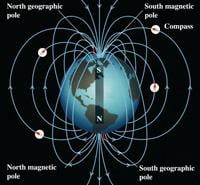
August 5, 2011 – Women with high exposure to magnetic fields during pregnancy may have a higher risk of asthma in their children, according to a Kaiser Permanente study appearing online in the Archives of Pediatrics & Adolescent Medicine.
In this prospective study, researchers compared the daily magnetic field (MF) exposure of 801 pregnant women in Kaiser Permanente Northern California and used electronic medical records (EMR) to follow their children for 13 years to see which children developed asthma. The study found that women with high magnetic field exposure in pregnancy had a more than threefold risk of asthma in their offspring compared with mothers whose exposure level was low.
This is the first study to demonstrate a link between maternal magnetic field exposure in pregnancy and the risk of asthma in offspring. Previous research has found that magnetic fields – generated typically by power lines and appliances such as microwave ovens, hair dryers and vacuum cleaners – could lead to miscarriage, poor semen quality, immune disorders and certain type of cancers. Recently, the International Agency for Research on Cancer, a WHO agency, classified radio frequency electromagnetic fields (RF-EMF) as a possible carcinogen.
"While the replication of the finding is needed, the message here is exposure to electromagnetic fields is not good, and we need to pay attention to its adverse effect on health," said study lead author De-Kun Li, M.D., Ph.D., a reproductive and perinatal epidemiologist at the Kaiser Permanente Division of Research in Oakland, Calif. Li published the original study in 2002 that found high MF exposure can lead to miscarriage.
The prevalence of asthma has been steadily rising since the 1980s, making it the most common chronic condition among children. Thirteen percent of children under 18 have asthma, which is caused by malfunction of the respiratory organs and the immune system.
"EMF exposure is ubiquitous. Because of the widespread exposure, any adverse health effect of EMF could impact many people and cause a serious public health problem," said Li.
Studying the EMF health effect has been difficult because everyone is exposed to EMF at some level, so there is no truly "unexposed control group" for easy comparison, researchers said. Health researchers must rely on comparing those with high EMF exposure levels to those with low EMF exposure levels to detect potential adverse EMF effects, Li said.
Women in this study wore a small meter during their pregnancy that measured their daily exposure to low frequency magnetic fields from electricity-related sources such as microwave ovens, hair dryers, vacuum cleaners, fans, coffee grinders, fluorescent light bulbs, power lines and transformer stations. This study did not measure high frequency (radio frequency) magnetic fields from wireless networks, wireless towers and wireless devices such as cell phones and smart meters. The researchers adjusted for study participants who lived near freeways but it did not change the results of the EMF-asthma association.
"In this study, we observed a dose-response relationship between mother's MF level in pregnancy and the asthma risk in her offspring. In other words, a higher maternal MF exposure during pregnancy led to a higher asthma risk in offspring," Li said.
In this new study, the researchers also found that two known risk factors for asthma, maternal history of asthma and being the first-born child, exacerbated the magnetic field effect on the asthma risk. "This finding further supports the MF-asthma association," said Li.
"The best way to reduce your magnetic field exposure is distance. Magnetic field strength drops dramatically with increasing distance from the source," said Li. "So pregnant women should try to limit their exposure to known MF sources and keep distance from them when they are in use."
The study was funded in part by the California Public Health Foundation. Co-authors on the study include Hong Chen, MPH, and Roxana Odouli, MSPH, both of the Kaiser Permanente Division of Research.
For more information: www.dor.kaiser.org/


 February 18, 2026
February 18, 2026 









